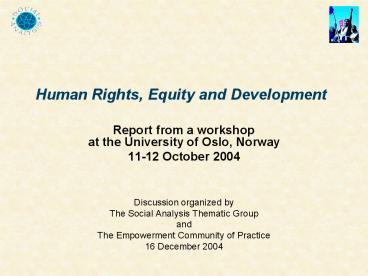Human Rights, Equity and Development - PowerPoint PPT Presentation
1 / 11
Title:
Human Rights, Equity and Development
Description:
Human Rights, Equity and Development. Report from a workshop. at the University of Oslo, Norway ... Government representatives from Norway, Finland, Sweden, Denmark ... – PowerPoint PPT presentation
Number of Views:80
Avg rating:3.0/5.0
Title: Human Rights, Equity and Development
1
Human Rights, Equity and Development
- Report from a workshopat the University of Oslo,
Norway - 11-12 October 2004
- Discussion organized by
- The Social Analysis Thematic Group
- and
- The Empowerment Community of Practice
- 16 December 2004
2
Oslo Workshop
- Organized by University of Oslos Centre for
Human Rights, and Centre for Development and the
Environment, October workshop, supported by
Government of Norway - Objectives
- Explore rights based approaches to development
and their relationship to equity - Provide inputs to WDR 2006 on equity
- Suggest future research and collaboration on
human rights - Participation by human rights and development
specialists - Researchers, from Europe, North America, Asia
- Government representatives from Norway, Finland,
Sweden, Denmark - World Bank participation Legal, Social
Development, PREM, WDR team
3
Oslo Workshop Sessions
- Conceptual Frameworks
- Legal Perspectives
- Sectoral Implications Right to Health
- Womens Rights
- Participation, Empowerment, Accountability
- Implications for the WDR 2006
- Rights at Country Level and the Role of IFIs
- Recommendations for Follow-up Research and
Collaboration
4
Key Recommendations
- Improve sharing and learning from different
experiences - e.g. Scandinavia
- Consider ways to strengthen a human rights agenda
in the World Bank - but cautions against new bureaucratic
requirements - Improve quality of measurement and impact
analysis - e.g. work on empowerment indicators
- Strengthen knowledge base on experiences with
rights based approaches - e.g. country experience and strengthening of
local institutions particular focus on PRSPs
5
Background
- Interest in strengthening understanding and
attention to human rights in the Banks work - Recognition that there is considerable overlap
between the Banks work and human rights
standards - Ongoing engagement and activities, e.g.
- Senior advisor in MDs office
- Working group convened by ESSD VP
- Discussions between the Bank and different
governments including Scandinavians - Network activities PREM, SDV, others
- World Summit for Social Development and Bank
participation - March workshop jointly with DFID on Power, Rights
and Poverty
6
Challenges
- Lack of clarity and agreement globally on what is
meant by a rights-based approach to development - Perception that human rights leave little room
for the tradeoffs or incremental progress we know
from development practice - Concern that this may impose standards that
cannot be complied with - Confusion over rights to opportunities versus
rights to outcomes - Concern that this may be seen as political
interference contrary to the Banks Articles of
Agreement - Should the Bank formally adopt human rights
standards or policies if so, which?
7
Human Rights Background and concepts
- UN Charter, international legally binding treaty
- 1948 Universal Declaration of Human Rights
- Equality and non-discrimination
- Civil and political rights
- Economic, social and cultural rights
- 1976 passing of International Bill on Human
Rights - Various conventions and agreements, e.g.
- 1979 CEDAW
- 1989 Rights of the Child
- 2003 Migrants Rights (ratified by 22 countries,
all developing) - 1993 Vienna principle all human rights are
universal, indivisible, interdependent, and
interrelated - Definitions of rights
- Legitimate claims that give rise to correlative
obligations or duties - Requires presence of power or authority confer
legitimacy on claims made - Various rights and rights regimes
- Universal human rights and international
covenants - Individual and group rights
- National legislation
- Customary and religious law
8
The Right to Development
- Many issues still to be resolved, and lack of
consensus, cf. Sfeir-Younis, 2003 - Development compact?
- Process or outcomes?
- How to make rights operational and
implementable? - Monitoring mechanisms?
- Many development agencies have explicitly adopted
rights-based approaches, both bilaterals such as
DFID, SIDA, and NORAD, and UN agencies such as
UNICEF and WHO. - Emerging principles
- Empowerment of poor people as agents and rights
holders, not as recipients or beneficiaries of
welfare - Links to international human rights
- Focus on accountability of states and other
development agencies - Strengthening peoples participation
- Equality and non-discrimination
- Special attention to poor and vulnerable groups
9
UN Rapporteur onthe Right to Development
- 2002 Report to the UN Commission on Human Rights
- Importance of economic growth rights-based
economic growth with equity and justice - Suggests reconciliation of competing concerns
- Economic, social, cultural rights
- Civil and political rights
- Argues for obligations both of developing
countries and the international community - Key principles
- Participation
- Accountability
- Transparency
- Equity
- Non-discrimination
- Suggested requirements
- Realization of human rights and fundamental
freedoms as the central aim - Independent rights-based mechanism to monitor the
performances of all countries
10
Different philosophies?
11
Towards Convergence?A Social Development
Perspective
- GOALS
- People-centered development
- Equity
- Integration of economic, cultural, social
polices - Transparent and accountable governance
- Democracy, justice, tolerance, respect for
diversity - Protect and support the disadvantaged and
vulnerable































